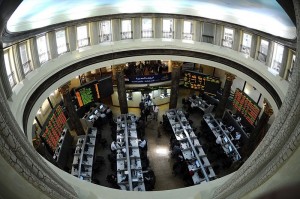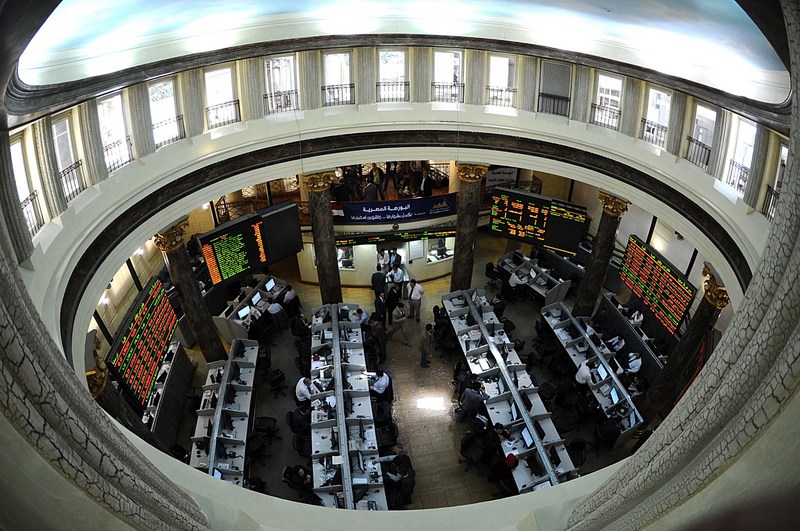
(Photo by Mohamed Omar)
The government decided on Monday to halt a 10% tax on capital gains for a period of two years, to maintain the domestic market competitiveness, whilst maintaining the 10% tax on dividends.
Minister of Investment Ashraf Salman told the Daily News Egypt that the decision is necessary to deepen the market, which is still recovering. “We have not yet considered the consequences of the presidential decree of ceasing the tax for two years,” added Salman.
Following the decision, stock market indices inched up showing recovery. The benchmark index EGX-30 increased by 6.45%, registering 8793.47 points.
The broader index EGX-100 rose 6.38% to close at 978.89 points, while the small and medium enterprises index EGX-70 closed at 468.47 points, a 7.33% jump compared to the preceding day. The capped index EGX-20 recorded 9,097 points, marking a 7.38% increase.
Head of the Egyptian stock market (EGX) Mohamed Omran said the decision shows the government understands the “developmental role” that the stock market is playing. He pointed out that over EGP 100bn has been pumped in increasing capitals through the companies listed in the market during the last decade.
“The government’s response explicitly means that this government is fully informed with the economic conditions and has a clear and organised vision of the development process,” Omran said, noting that the decision sends a message that the government is committed to support investment climate.
Commenting on the stock market’s performance following the decision, Prime Holding Group CEO Mohamed Maher said the hike or fall of stock market indices is not a real indicator, however, the initial reaction of the decision was a positive indication. “What really matters are the number and kind of traders and the volume of trading,” he explained.
Whether the halt will be two years as mentioned or may face an extension, Maher expected talks between the stock market and the Ministry of Finance to discuss all the potentials.
In protest against the ambiguity of the new tax application mechanism and the additional burdens it imposes on them, EGX Board Member Hisham Tawfik said: “The tax Egypt imposed last July resulted in a liquidity squeeze and the exit of many Egyptian and foreign investors from the market.”
Egyptian Direct Investment Association chairman Hani Tawfik believes that the government’s back-down from a decision that resulted in the deterioration of the stock market and the displacement of thousands of employees, is very serious step.
He added that the stock market is affected negatively and positively by the stability of monetary and fiscal policies, expansionary, not deflationary and repellent. He also demanded from the government a speedy improvement of the business environment and the investment climate through non-deflationary economic policies.
Cabinet spokesperson Hossam Qawish said that the cabinet gave its directions regarding the need to develop the Egyptian Stock Exchange (EGX) as a platform for financing the Egyptian economy, and as a means of investment, capital attraction, and economic development.
Qawish said that the government retained the tax on dividends levied only once without adding the net revenue to another tax in another category.
The government’s statement was issued Monday morning after a meeting held Sunday evening between Prime Minister Ibrahim Mehleb, the Economic Group of the cabinet, and the president of the EGX, in which they agreed on postponing imposing the capital gains tax with the continuation of the dividend tax.
In the past, the EGX was completely exempted from any taxes on profits earned as a result of transactions or dividends distributed to shareholders of listed corporations, whether in cash or in stock.
Last July, Mehleb’s government approved imposing a 10% tax on dividends, in addition to another 10% tax on capital gains earned from investment in the stock market.
“Freezing the tax for two years is important, but what is the government’s plan after these two years end?” wondered Hisham Tawfik. “But the decision is positive and reflects the government’s understanding of the problems of the securities industry resulting from random decisions.”
Hani Tawfik added to this: “I am still convinced of the need to impose a single tax of 10% on the annual net profit of trading, paid only once at the end of the year, and it should be imposed in times of recovery and prosperity, and not now,” explained Tawfik.
“Facilitating listing new giant private or public corporations will restore the lost confidence in the stock market, as well as attract new investors with strong financial solvency and local and international investment funds, which would raise the low trading volume,” he said.




